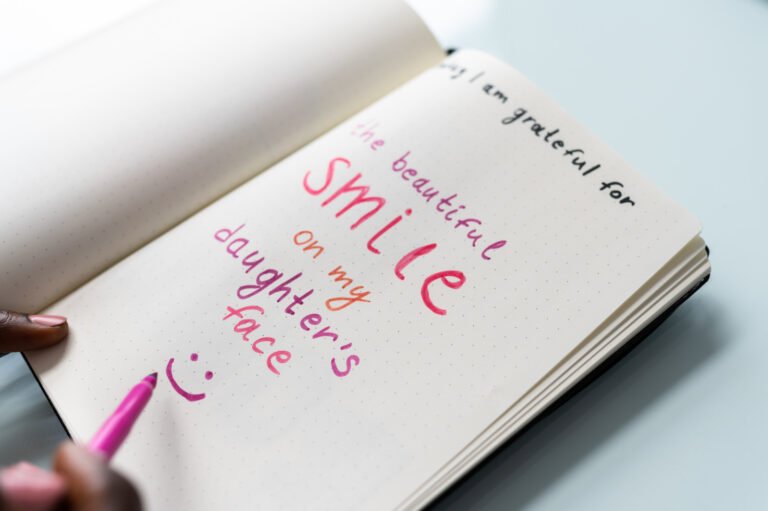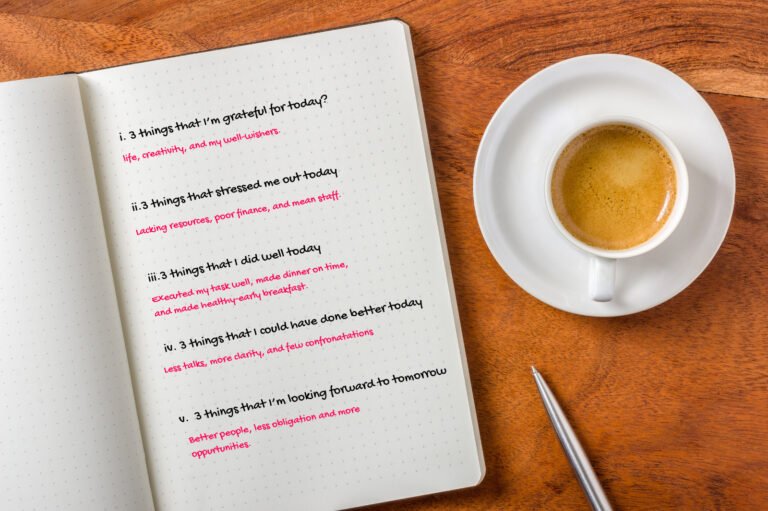Writing Myself Own: 5 Self-Care Journal Ideas for Well-being
"
In this article, we will explain what self-care journaling means, how it helps an individual, its strengths and also how one can start writing a self-care journal.
The goal is to spread awareness among people to develop healthy ways of coping with overwhelming emotions.
What is a Self-Care Journal?
Have you ever read the autobiography of Mahatma Gandhi? How the book demonstrates his experiences, challenges and struggles in his life.
But let me break it to you, Self-care journaling is something that is extremely private and intimate. It is an individualised and tailor-made practice to meet the needs of oneself.
A self-care journal is a personal diary that one uses to record and reflect on one’s self-care practices, experiences and emotions. It serves as a dedicated space for individuals to explore, document and put their thoughts into one place.
The purpose of a self-care journal is to promote self-awareness, mindfulness and prioritise your overall mental health and well-being.
The aim of self-care journaling is to build your ability to reflect on your experiences and how you respond to them.
Related Article: 5 Extraordinary Benefits of Self Care
How to make a self-care journal?
I believe self-care journaling is one of the simplest and less complicated life skill tools that I have ever come across in my life. There is rocket science in making a self-care journal, all you need is a pen and paper to write down everything you are feeling.
There is no pressure to write huge amounts or to write in a way that makes sense to anyone else. It is solely for you to build awareness of your thoughts and emotions so that you can work on them in the future.
Related Article: Be Your Best Self: The Psychology of Self-Control (A guide)
How to start a self-care journal?
“Self-care” journal has become a trendy buzzword lately. However, on the surface, self-care may mean having a bubble bath and getting massages.
But if I dig deeper into the real essence of taking care of yourself, it’s more about understanding what our inner selves need and then addressing those needs. More than that, understanding what our inner selves are struggling with – those emotions that we fail to process otherwise.
Sometimes, we don’t know why we’re in a bad mood or why we’re suddenly overreacting and getting angry at someone that we care about.
When you feel that you have too many untangled thoughts that you cannot make sense of, that’s when you start writing your thoughts down. Personally, writing my thoughts and feelings down is like finding a friend in me. Knowing myself a little more each day.
Sometimes the things that you struggle with are not easily sharable with other people because in your head they are so confusing that you yourself cannot make sense of it.
And therefore, journaling creates a safe space with just a pen and a paper that helps you release the emotional tensions that are burdening you without the fear of being judged or not listened to.
Start journaling your thoughts when you feel lost in your thoughts, instead of waiting to get more lost in them.
Related Article: Six Foundation Pillars On How To Master Self-Love
What to write in a self-care journal?
Writing a self-care journal can be a highly personal and therapeutic practice. It’s all about reflecting on your self-care journey, emotions, experiences and growth. Here are some of the things that you can write in a self-care journal.
1. Daily self-care routines
One can record their self-care activities that you engage in regularly, such as meditation, exercise, reading or spending time with your family and friends.
Reflect on how these activities make you feel and their impact on your well-being. You can keep track of your growth by writing down how those activities make you feel.
2. Emotions and Feelings
Journaling could be used as a safe space to pour down your overwhelming emotions and feelings. Write about what’s been bothering you, what has made you happy today or what challenges you are facing.
Related Article: 8 Impactful Themes of the Seven Husbands of Evelyn Hugo
3. Accomplishments and Victories
Journaling doesn’t have to be done when you are only struggling, you can also journal your victories and your proud moments.
You can celebrate your achievements, no matter how minor they may seem. Acknowledge your progress and the efforts you put into self-improvement.
4. Gratitude
Writing down things you are grateful for each day or week. Gratitude writing helps you focus on the positive aspects of your life and acknowledge the good things, no matter how big or small.
Related Article: 10 Things Can Help You Practice Gratitude For Small Things
5. You Engage in Self-Reflection
Engaging in introspection and exploring your own values, beliefs and personal growth. You can ask yourself questions like, what do I need right now? Or what can I do to take better care of myself? This will help you to be more self-resilient and self-aware of yourself.
Related Article: 7 ways to conquer depression
Self-care Journal Prompts
You can write about whatever thoughts or emotions you’re experiencing. Some people find it helpful to write about their day-to-day experiences, while others prefer to focus on specific issues or challenges they’re facing. If you’re struggling to get started, you can try prompts such as:
- What are 3 things that I’m grateful for today?
- What are 3 things that stressed me out today?
- What are 3 things that I did well today?
- What are 3 things that I could have done better today?
- What are 3 things that I’m looking forward to tomorrow?
These prompts can help you to reflect on your day and to identify areas that you may want to work on. However, it’s important to write about whatever is on your mind, and not to force yourself to write about things that you’re not comfortable with.
Benefits of a Self-Care Journal
The journaling process is different for every person. For example, some people like to journal before going to bed, while others may prefer writing in the mornings. It can take some time to find the right routine but what matters most is that you are giving your mind some time in delving and uncovering important thoughts and feelings.
Studies show that time spent journaling about our deepest thoughts and feelings can even reduce the number of sick days we take off work.
You may be surprised to learn that one of the best wellness tools is actually journaling. Journaling offers a range of benefits – from easing stress to sparking self-discovery.
Here are five benefits of putting pen to paper.
1. Journaling boosts your health and well-being
When you pen down your deepest thoughts and emotions, you are much more likely to overcome health issues caused by
- Those unsettling thoughts and emotions
- Reduced blood pressure
- Low heart rate and
- Overall improved well-being
Related Article: Learn the Relationship between Happiness and Wellbeing
2. Journaling encourages space from negative thoughts
When negative thoughts arise and they keep ruminating in our brains, it is easy to get caught up in those catastrophic stories. Jotting down your thoughts creates space and distance to consider them in a more objective way.
The point is that every thought that occurs isn’t a fact. If your thoughts aren’t serving you then you don’t have to believe them. Instead, you can use journaling to see your thoughts separate from you.
Related Article: The Power of Positivity: Avoiding the 5 Toxic Forms of Negativity
3. Journaling deepens self-discovery
In your life, you get to discover a different piece of the puzzle every single day. You discover a new thing about yourself as you proceed in your life.
Journaling provides a much-needed pause to help us reconnect to ourselves and rediscover who we are. When we write, we learn about our preferences, pain points, fears and dreams.
As humans, we are constantly evolving and changing and journaling helps us to listen and bear witness to these changes.
4. Helping you to find solutions
When you journal about your self-care journey, you may find yourself realising so many things that will help you into developing new ideas for how to better take care of yourself. This can be helpful in times when you feel stuck or when you are not sure what to do next.
5. Gives a sense of control
When you journal, you’re in control of the content. You know what you are writing and why you are writing that in there. This can be empowering especially if you feel like you don’t have much control over other aspects of your life.
A study published found that self-care journaling can help reduce symptoms of PTSD.
After 8 weeks, the participants showed significantly reduced symptoms of PTSD.
No matter however, good benefits are, we as individuals struggle to write it in a piece of paper. We all know journaling is a great idea but we have absolutely no idea how to journal our thoughts all together.
So here are some ideas that can help you write when you sit to write your self care Journal.
Top 3 Self-Care Journaling Ideas
There are varied ways in which you can journal your thoughts and emotions. There is no need to limit yourself, you should experiment and discover different journaling ideas.
1. Art Journaling
This is a creative blend of writing, drawing and painting. You don’t have to be artistic it’s just about enjoying the process and feeling every bit of it. The goal is to find a way that can help you journal your feelings that you are otherwise unable to express or understand with plain words.
2. Bullet Journaling
Bullet Journaling will appeal to those who love organisation. This list and tracking approach to journaling is relatively a new way developed. It involves schedules, to-do lists, reminders and brainstorming exercises.
3. Nature Journaling
If you love nature, you’ll appreciate this thoughtful approach to journaling. Nature journaling is the practice of observing and writing about nature. You can write detailed descriptions about a favourite landscape or sit on your porch and write about your observations of neighbourhood wildlife.
The practice of nature journaling is calming and helps you increase your attention to the details around you.
Final Thoughts
Remember that journaling is a personal practice, and there’s no right or wrong way to do it. Allow yourself to be authentic and vulnerable in your journal, and let it be a space where you can truly explore and embrace self-care in all its forms. Happy journaling!
Subscribe to new post
The One Liner
Useful Links
Order Related Queries
Useful Links
Order Related Queries








